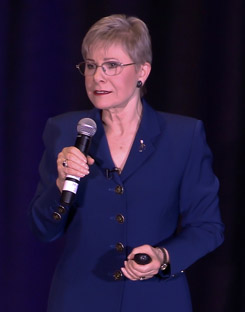
I first had the honor of speaking at the Ragan Speechwriters Conference in 2003. It was an exciting experience and I made many new friends, including John Howze who kindly allowed me share his “best of” conference notes with my readers. Consider how you might incorporate some of these ideas into your public speaking and writing. Remember, many of the presenters at the Ragan Speechwriters Conference literally write for history.
- The communicator’s job is to make the important, interesting.
- People believe stories more readily than numbers or statistics. The hearer processes stories in three ways: intellectually, emotionally, and visually (slides, speaker’s movements). Start with a story, then use a statistic or visual to emphasize or elaborate the point.
- Remember the “Who” factor; people are interested in other people. Use stories about people, particularly about heroes. Look internally and externally to the workplace for the stories. Keep an archive or clip file with stories of people you admire, etc.
- The best transitions look forward. (“Fast forward seven years,” is one transition I used for one client.)
- Sound words build tension. Crack! (Was that lightning?) In the speech, build tension and then break it or relieve it as a means of holding audience attention. We all love suspense.
- Smell words and other sensory words also trigger the formation of memory. See, hear, smell, feel, taste what?
- Writing is architecture, not interior design. Twist a phrase: “You can’t teach a young dog old tricks.” – Warren Buffet, billionaire on why he consistently hires retirement-age managers rather than younger ones.

- Add interest to your writing and speaking with alliteration, repetition, and rhythm.
- Statistics should be used sparingly and distilled. Startling numbers are effective.
- Quotes allow us to borrow the best that has been said or written. They can convey authority, brevity, relevance, humor, etc. Quotes get the human voice in your speech. Use contemporary quotes if possible. Be accurate. Use tone of voice to convey the quote, rather than saying “quote-unquote.” Edit quotes down to the meat. Paraphrase quotes longer than one or two lines.
- And one of the personal favorites I heard, “Tell the story of the war through the eyes of one soldier.”
Thank you John. For more than three decades, Ragan Communications has been an excellent source of information on public speaking and writing.
My executive speech coaching clients include corporate leaders, celebrity speakers, well-known sports and media personalities, and sales teams. You can learn many of the public speaking secrets I share with my executive speech coaching clients at my events or through my learning materials.
Get more information on my Create and Deliver Powerful Presentations Champ Camp, December 4 – 6, 2013 in Las Vegas with Darren L aCroix. (Our June event was completely sold out!) For information on upcoming public speaking and presentation skills events that are open to the public visit: https://fripp.com/public-speaking-events/
aCroix. (Our June event was completely sold out!) For information on upcoming public speaking and presentation skills events that are open to the public visit: https://fripp.com/public-speaking-events/
Learn effective presentation skills, and perfect your business presentations through CDs, DVDs and digital downloads: https://fripp.com/store/public-speaking/
Executive Speech Coach and Hall of Fame Keynote Speaker, Patricia Fripp is hired by individuals and companies who realize that powerful, persuasive presentation skills give them a competitive edge.
